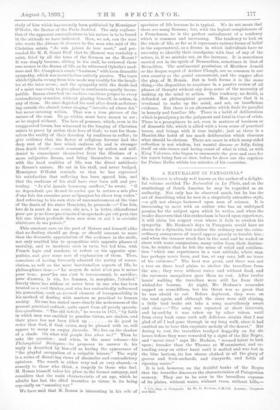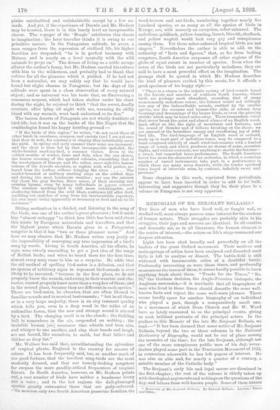A NATURALIST IN PATAGONIA.*
MR. HUDSON is already well known as the author of a delight- ful volume entitled The Naturalist in La Plata, and on the ornithology of South America he may be regarded as an authority. Not only has he observed much, but he has the art of describing what he sees in a singularly attractive style, —a gift not always bestowed upon men of science, It is interesting to meet with an author who has an unfeigned passion for the subject upon which be writes, and when the reader discovers that this enthusiasm is based upon experience, it will claim his respect even where it fails to awaken his sympathy. Mr. Hudson's days in Patagonia would have no charm for a Sybarite, but neither the ordinary nor the extra- ordinary annoyances of travel appear greatly to trouble him ; and when the steamer stuck fast in the sand and he waded on shore with some companions, many miles from their destina- tion, he relates that he felt the sense of relief and exhilara- tion "which one experiences in a vast solitude, where man has perhaps never been, and has, at any rate, left no trace of his existence." The heat was great, and there was not a tree on those level plains to shelter the travellers from the sun ; they were without water and without food, and the ravenous mosquitoes gave them no rest. After twelve hours' walking the travellers were still far from their wished-for bourne. At night, Mr. Hudson's comrades supped on armadilloes, but his thirst was so groat that he was afraid to eat. Before daybreak, they were on the road again, and although the stars were still shining, a little bird broke out into a song marvellously sweet and clear :—" The song was repeated at short intervals, and by-and-by it was taken up by other voices, until from every bush came such soft delicious strains that I was glad of all I had gone through in my long walk, since it had enabled me to hear this exquisite melody of the desert." Not daring to rest, the travellers trudged doggedly on for six hours before they were rewarded by a sight of the Rio Negro, and "never river" says Mr. Hudson, " seemed fairer to look upon; broader than the Thames at Westminster, and ex- tending away on either hand until it melted and was lost in the blue horizon, its low shores clothed in all the glory of groves and fruit-orchards, and vineyards, and fields of ripening maize."
It is not, however, on the fruitful banks of the Negro that the traveller discovers the characteristics of Patagonian scenery. They are to be seen in the boundless expanse of its plains, without water, without trees, without hills,- ---- * late Days in Patagonia, By W. H. Hudson, Loudon: Chapman and Hall. plains uninhabited and uninhabitable except by a few no- mads. And yet, if the experience of Darwin and Mr. Hudson may be trusted, there is in this lonely level an inexpressible charm. The voyager of the Beagle' attributes this charm to imagination ; the later traveller thinks it is owing to our primitive nature. In the Patagonian solitude, he avers, a man escapes from the repression of civilised life, his higher faculties are suspended, "he is in perfect harmony with Nature, and is nearly on a level mentally with the wild animals he preys on." The dream of living as a noble savage allures the author's fancy, but Mr. Hudson carried his culture with him to the wilderness, and probably had to thank that culture for all the pleasure which it yielded. If he had not been a naturalist, we may safely say that he would have found but slight charms in Patagonia; but the days of his solitude were spent in a close observation of every natural object; and so universal was his taste that, on discovering a venomous serpent, which had taken shelter under his cloak -during the night, he rejoiced to think " that the secret, deadly creature, after lying all night with me, warming its chilly blood with my warmth, went back unbruised to its den."
The barren deserts of Patagonia are not wholly destitute of bird-life, but it was on the banks of the Rio Negro that the ornithologist found his happy hunting-ground :- " If the birds of this region," he writes, " do not excel those of other lands in sweetness, compass, and variety (and I am not sure that they do not), for constancy in singing they indubitably carry the palm. In spring and early summer their notes are incessant ; and the choir is then led by that incomparable melodist, the white-banded mocking-bird, a summer visitor. Even in the coldest months of winter, June and July, when the sun shines, the hoarse crooning of the spotted columba, resembling that of the wood-pigeon of Europe, and the softer, more sigh-like lamen- tations of the Zenaida maculata, so replete with wild pathos, are
heard from the leafless willows fringing the river The scarlet-breasted or military starling sings on the coldest days and during the most boisterous weather ; nor can the rainiest sky cheat the grey finches, Diuca minor, of their morning and evening hymns, sung by many individuals in joyous concert. The common mocking-bird is still more indefatigable, and sheltering himself from the cold blast, continues till after dark, warbling out snatches of song from his inexhaustible repertory, his own music being apparently as necessary as food and air to his existence."
Sitting motionless in a thicket, and listening to the song of the birds, was one of the author's great pleasures ; but it made him " almost unhappy " to think how little has been said about this music by European naturalists and travellers, and that the highest praise which Darwin gives to a Patagonian songster is that it has "two or three pleasant notes." And here we may observe that Mr. Hudson writes very justly on the impossibility of conveying any true impression of a bird's song by words. Living in South America, all his efforts, he says, were utterly unavailing to get a just idea of the songs of British birds; and when he heard them for the first time, almost every song came to him as a surprise. He adds that the old method of spelling bird-notes is a delusion, and that no system of arbitrary signs to represent bird-sounds is ever likely to be invented, " because in the first place, we do not properly know the sounds, and owing to their number and cha- racter, cannot properly know more than a very few of them; and in the second place, because they are different in each species." There are bird-notes, he observes, that are often likened to familiar sounds and to musical instruments ; " but in all these, or in a very largo majority, there is an airy resonant quality which tells you, even in a deep wood in the midst of an unfamiliar fauna, that the new and strange sound is uttered by a bird. The clanging anvil is in the clouds ; the tinkling bell is somewhere in the air, suspended on nothing ; the invisible human [sic] creatures that whistle and hum airs, and whisper to one another, and clap their hands and laugh, are not bound, like ourselves, to earth, but float hither and thither as they list."
Mr. Wallace has said that, notwithstanding the splendour of tropical plants, England is the country for masses of colour. It has been frequently said, too, as another mark of our good fortune, that the loveliest song-birds are the most modestly dressed, and that our homely-looking songsters far surpass the more gaudily-attired frequenters of tropical forests. In South America, however, as Mr. Hudson points out, a vast number of birds have neither a handsome livery nor a voice ; and in the hot regions the dull-plumaged species greatly outnumber those that are gaily-coloured. " To mention only two South American passerine families, the wood-hewers and ant-birds, numbering together nearly five hundred species, or as many as all the species of birds in Europe, are, with scarcely an exception, sober-coloured. The melodious goldfinch, yellow-bunting, linnet, blue-tit, chaffinch, and yellow wagtail would look very gay and conspicuous among them. Yet these sober-coloured tropical birds are not singers." Nevertheless the author is able to add, on the authority of "facts and figures," that, so far from lacking songsters, South America surpasses all other regions of the globe of equal extent in number of species. Even when the notes of the birds are not particularly melodious, they are said to have a most powerful effect on the imagination. The passage shall be quoted in which Mr. Hudson describes the kind of pleasure excited by this music, for it affords a good specimen of his happy style :-- " There is a charm in the infinite variety of bird-sounds heard in the forests and marshes of southern South America, where birds are perhaps most abundant, exceeding that of many monotonously melodious voices ; the listener would not willingly lose any of the indescribable sounds, emitted by the smaller species, nor the screams and human-like calls, or solemn deep boomings and drummings of the larger kinds, or even the piercing shrieks which may be heard miles away. Those tremendous voices that never break the quiet and almost silence of an English wood- land, affect us like the sight of mountains and torrents, and the sound of thunder and of billows breaking on the shore ; we are amazed at the boundless energy and overflowing joy of wild- bird life. The bird-language of an English wood or orchard, made up in most part of melodious tones, may be compared to a band composed entirely of small wind-instruments with a limited range of sound, and which produces no storms of noise, eccentric flights, and violent contrasts, nor anything to startle the listener— a sweet, but somewhat tame performance. The South American forest has more the character of an orchestra, in which a countless number of varied instruments take part in a performance iu which there are many noisy discords, while the tender spiritual tones heard at intervals seem, by contrast, infinitely sweet and precious."
Some chapters in this work, reprinted from periodicals, appear to have been inserted in order to add to it bulk. Interesting and suggestive though they be, their place in a volume on Pa,tagonia, is not very apparent.



































 Previous page
Previous page